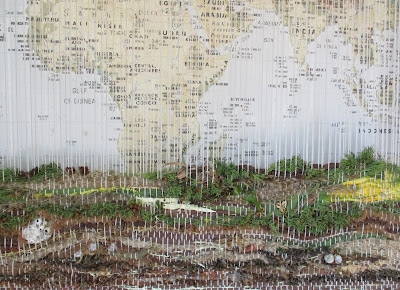"Turning points in a life that seemed set on a predictable path suddendly emerge. (...) a reality check sets in. Once past certainties have collapsed, one begins to look at the world with different eyes. Emotions change. (...) The cunning of uncertainty lets in the unexpected. It makes room for the new, even if the new is often made from clever and unexpected recombinations of already existing elements. Poised on the threshold between the present and the unknowable future, it invites us to join the dance." Helga Nowotony (2016). The Cunning of Uncertainty. Image by Monica Pinheiro, license CC BY-NC-SA ( CC ).

"More than conversation at the interface, it is creative assemblages like these that explore and elaborate the particular dynamic capacities that digital media afford and the ways that through them humans and machines can perform interesting new effects (...) in uniquely particular ways." Lucy Suchman (2009). Human-machine reconfigurations: plans and situated actions.
Mar 12, 2022
March
March
Call it what you will - futures, utopias, dreams - but remeber they "are imperfect, they are imaginative, they are joyful and wild, they are shamelessly emotive, and they are growing up through the cracks in extractivist capitalism." So today, like Malaika Cunningham, I invite you "to look for the roses around you. Those things which bring you pleasure, meaning and peace for no discernible reason other than they are beautiful and, for this, they make your world better." in Bread & Roses. Image of organic city garden, taken March 1, 2022, by Monica Pinheiro, license CC BY-NC-SA ( CC ).
Feb 28, 2022
Kindness by default

As earthling, living in Portugal, I can´t imagine what Ukraine beings are going through in these hours, or what it must feel for Russian beings, having someone decide in their name to commit such an atrocity, so contrary to human species default to protect, care and blossom. Amidst another much bigger war of infinite greed, we add the greed for more territory, more resources, more terror, more power. Enough should be enough to concentrate on the habitability of the finitude of our Planet.
What is happening is an aberration, an abnormality of the system, a hideous crime against us all. The system must be corrected. We are all encoded to be kind by default (*). We need to remind ourselves that what makes vibrant communities is respect, communion, sharing, and a lot of love for the extra energy to transcend ourselves (and endure in the most difficult of times).
(*) Be alert for manipulation! We have been manipulated throughout history to believe that greed is our nature. It is not. More about it in Rutger Bregman (2021). Humankind: A Hopeful History.Feb 20, 2022
February
"(...) I can think of no better form of personal involvement than that of gardening. A person who is growing a garden (...) organically, is improving a piece of the world. (...) A person who undertakes to grow a garden at home, by practices that will preserve rather than exploit the economy of the soil, has set [her or] his mind decisively against what is wrong with us." Wendell Berry (2021). What I Stand for Is What I Stand On. Image by Monica Pinheiro, license CC BY-NC-SA ( CC ).
February
Feb 5, 2022
February
Feb 4, 2022
February
Jan 20, 2022
Mycorrhizal network
Jan 15, 2022
January
Jan 14, 2022
January
"I comb through the mess of existing worlds-in-the-making, looking for treasures - each distinctive and unlikely to be found again." Anna Lowenhaupt Tsing (2017). The Mushroom at the End of the World: on the Possibility of Life in capitalist Ruins. Image by Monica Pinheiro, license CC BY-NC-SA (CC).












